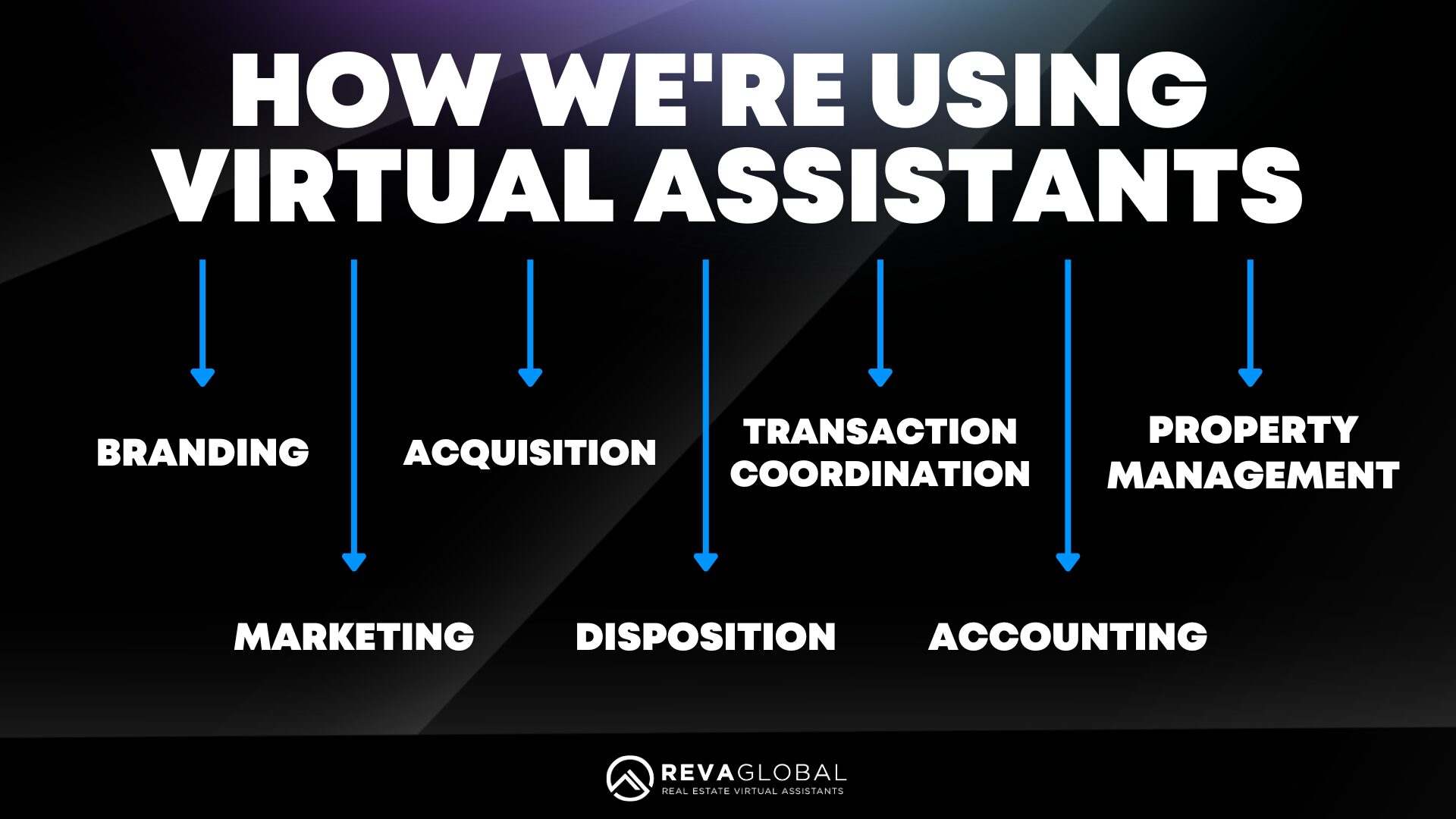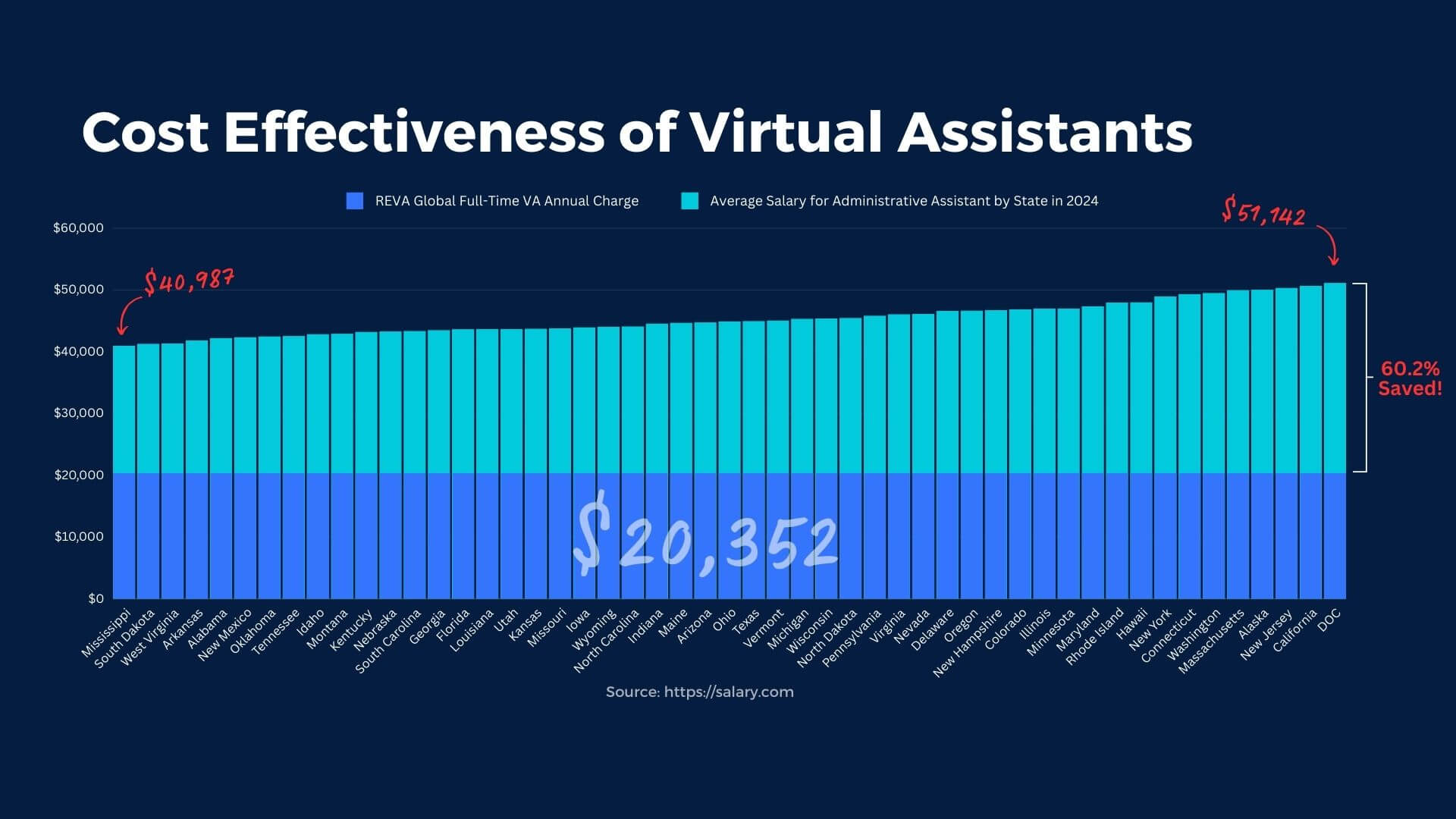Maximizing Business Efficiency: How Virtual Assistants Transform Real Estate Operations
Businesses across various industries are increasingly relying on virtual assistants (VAs) to streamline operations, boost productivity, and cut costs. The real estate industry is no exception. From branding to property management, virtual assistants play a crucial role in optimizing different aspects of real estate operations. This article explores how real estate businesses are utilizing virtual assistants in key areas to enhance efficiency and drive growth.
Luckily in today’s tech-savvy world, virtual professionals from around the world have emerged as a powerful resource for enhancing operational efficiency and reducing costs for the property management industry. By integrating Virtual Assistants (VAs) across various departments, property management business owners can streamline operations, delegate tasks more effectively, and achieve significant cost savings.
Here’s a guide on how to effectively incorporate VAs, the specific tasks they can handle, and the benefits they offer.
How Virtual Assistants Transform Real Estate Operations
Branding: Enhancing Market Presence with Virtual Assistants
Branding is the cornerstone of any successful business, and in real estate, a strong brand can be the difference between a flourishing enterprise and a struggling one. Virtual assistants contribute significantly to branding efforts by handling a wide range of tasks, including social media management, content creation, and graphic design.
Integration Tips:
- Social Media Management: VAs can manage your social media accounts, ensuring consistent and engaging content is shared with your audience. They can schedule posts, respond to comments, and analyze social media metrics to optimize engagement.
- Content Creation: From blog posts to newsletters, virtual assistants can help produce high-quality content that resonates with your target audience. This content not only enhances your brand’s visibility but also establishes you as an authority in the real estate market.
- Graphic Design: Whether it’s designing logos, banners, or marketing materials, VAs skilled in graphic design can create visually appealing assets that reinforce your brand identity.By delegating these tasks to virtual assistants, real estate businesses can ensure their branding efforts are both consistent and professional, ultimately leading to increased brand recognition and customer loyalty.
Acquisition: Streamlining Lead Generation and Conversion
Real estate virtual assistants (VAs) can seamlessly integrate into the acquisition department for real estate investors by taking on crucial tasks that drive lead generation and conversion. These VAs are adept at managing cold calling, texting, and direct mail campaigns, effectively reaching out to potential sellers and identifying motivated leads. By handling the initial outreach, they save investors valuable time and ensure that no lead goes unattended.
Additionally, VAs excel at managing lead follow-up, keeping the communication flow steady and timely, which is vital for nurturing relationships and closing deals.
With their expertise, they can also set appointments, ensuring that investors meet with only the most qualified prospects, ultimately streamlining the acquisition process and boosting the efficiency of the entire department.
Integration Tips:
- Lead Generation: Real estate virtual assistants excel at driving lead generation through strategic cold calling, targeted texting, and personalized direct mail campaigns. By reaching out to potential sellers efficiently, they ensure a steady flow of qualified leads into your acquisition pipeline.
- Consistent Follow-Up: Consistent and timely follow-up is crucial for converting leads into deals. VAs manage ongoing communication with prospects, keeping them engaged and moving through the sales funnel, which increases the likelihood of closing more transactions.
- Appointment Setting: Virtual assistants streamline the appointment-setting process by pre-qualifying leads and scheduling meetings with only the most promising prospects. This allows investors to focus their time and energy on high-value opportunities, maximizing productivity and ROI.
Transaction Coordination: Ensuring Smooth and Timely Closures
Closing a real estate deal involves numerous steps and requires meticulous attention to detail. Virtual assistants are key players in transaction coordination, managing everything from paperwork to deadlines to ensure that deals close smoothly and on time.
Integration Tips:
- Paperwork Management: VAs can prepare, review, and organize all necessary documents, ensuring that everything is in order before the deal is finalized.
- Deadline Tracking: Virtual assistants keep track of critical deadlines, such as inspection dates and financing contingencies, to prevent any delays in the closing process.
- Communication Liaison: They act as intermediaries between buyers, sellers, agents, and other parties involved, ensuring clear and consistent communication throughout the transaction.
By taking charge of these tasks, virtual assistants help real estate businesses avoid costly delays and ensure that every transaction is completed without a hitch.
Property Management: Simplifying Day-to-Day Operations
Managing properties can be overwhelming, especially for real estate businesses that handle multiple properties. Virtual assistants provide essential support in property management by handling tenant communications, maintenance coordination, and financial management.
Integration Tips:
- Tenant Communication: VAs can manage tenant inquiries, handle lease renewals, and address any concerns or issues that arise, ensuring a positive tenant experience.
- Maintenance Coordination: Virtual assistants can schedule and oversee maintenance tasks, ensuring that properties are well-maintained and that any issues are resolved promptly.
- Financial Management: From collecting rent to managing invoices, VAs can take care of the financial aspects of property management, ensuring that cash flow remains steady and that all accounts are up to date
With virtual assistants taking care of these responsibilities, property managers can focus on strategic planning and growth, knowing that the day-to-day operations are in capable hands.
This REVA Global Property Management Model outlines the roles and responsibilities of virtual assistants (VAs) across four key areas: Acquisitions, Leasing, Customer Service, and Accounting.
Marketing: Expanding Reach and Growing Your Brand
Effective marketing is essential for attracting new clients and maintaining a steady flow of business. Virtual assistants contribute to real estate marketing efforts by managing digital marketing campaigns, creating promotional materials, and optimizing online presence.
Integration Tips:
- Digital Marketing Campaigns: VAs can set up and manage online advertising campaigns, track their performance, and make adjustments to maximize ROI.
- Promotional Materials: From flyers to email campaigns, virtual assistants can create compelling marketing materials that capture the attention of potential clients.
- SEO and Online Presence: VAs can optimize your website and content for search engines, ensuring that your business ranks higher in search results and attracts more organic traffic.
By leveraging the skills of virtual assistants in marketing, real estate businesses can expand their reach, generate more leads, and stay competitive in a crowded market.
Disposition: Facilitating Profitable Exits
Disposition, or the process of selling off properties, is a critical phase in the real estate lifecycle. Virtual assistants play a vital role in ensuring that properties are sold quickly and at the best possible price by managing listings, coordinating with buyers, and handling the necessary paperwork.
Integration Tips:
- Listing Management: VAs can create and manage property listings, ensuring that they are accurately described and attractively presented to potential buyers.
- Buyer Coordination: Virtual assistants handle inquiries from potential buyers, schedule viewings, and gather offers, facilitating a smooth selling process.
- Paperwork and Compliance: They ensure that all legal and compliance documents are prepared and submitted correctly, avoiding any potential legal issues during the sale.
With the support of virtual assistants, real estate professionals can maximize the profitability of their dispositions while minimizing the time and effort required to close deals.
Free Download!
Get your FREE download with over 100 tasks you can delegate to a real estate virtual assistant! Check out all the property management tasks you can pass on to a trained, dedicated virtual assistant.
Benefits and Cost-Effectiveness of Utilizing Remote Team Members
Cost Savings
Virtual assistants work on a contractual basis, which eliminates the need for full-time salaries, benefits, and office space. This can result in significant cost savings, particularly for tasks that don’t require a full-time presence.
Increased Efficiency
By delegating routine and administrative tasks to VAs, property managers can concentrate on high-value activities such as tenant relations and property improvements. This enhances overall operational efficiency and productivity.
Scalability
VAs offer flexible support that can be adjusted based on business needs, making it easier to scale operations up or down without the complexities associated with hiring full-time staff.
Access to Specialized Skills
VAs often have specialized skills in areas such as digital marketing, finance, or customer service. Leveraging these skills can improve the quality of work and fill gaps that might be present in-house.
Improved Work-Life Balance
Outsourcing tasks to VAs can help reduce stress and improve work-life balance for property managers. With routine tasks managed effectively, managers can focus on strategic decision-making and personal well-being.
This graph will let you visualize the cost-effectiveness of hiring full-time REVA Global VAs compared to the average salary of administrative assistants across various states in 2024. The annual charge for a REVA Global full-time VA is $20,352, which is significantly lower than the average salary for administrative assistants, which ranges from approximately $40,987 to $51,142 across the states. The substantial difference in costs highlights a potential saving of 60.2% by opting for virtual assistants over traditional administrative staff.
Virtual assistants are transforming the real estate industry by providing invaluable support across various aspects of the business. From branding and acquisition to transaction coordination and property management, VAs enable real estate professionals to focus on strategic growth and high-level decision-making while ensuring that day-to-day operations run smoothly. By leveraging the expertise of virtual assistants, real estate businesses can enhance efficiency, reduce costs, and ultimately achieve greater success in a competitive market.



